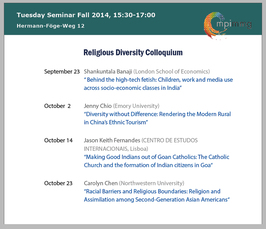"Behind the high-tech fetish: Children, work and media use across socio-economic classes in India"
Religious Diversity Colloquium Winter 2014/15
- Datum: 23.09.2014
- Uhrzeit: 15:30 - 17:00
- Vortragende: Shankuntala Banaji (London School of Economics)
- Dr Shakuntala Banaji is a Lecturer in Media and Communications and Programme Director for the Masters in Media, Communication and Development at the London School of Economics and Political Science. She has 21 years’ experience as a teacher and educational researcher, currently lecturing in Film Theory, World Cinema, International Media, Communication and Development. Shakuntala has been part of several large-scale research projects for the European Union and other funders; among these ‘Young people and democratic participation in the European Union’ for EACEA through LSE Enterprise (2010-2012); ‘Stakeholder Perspectives on Creativity and Innovation in Schooling in the EU27’ (IPTS 2009-2010) and CivicWeb: Young People, the Internet and Civic Participation (EU, Framework 6, 2006-2009). Her unfunded research with young people in South Asia in relation to media, representation, citizenship and technology use is on-going. Shakuntala has published widely on Cinema Audiences, Bollywood, Youth, Gender, Ethnicity, Politics, Creativity and Online Civic Participation. Recent books include South Asian Media Cultures: Audiences, Representations, Contexts (2010) from Anthem Press and The Civic Web: Young People, Civic Participation and the Internet in Europe, (2013) co-authored with David Buckingham.
- Ort: MPI-MMG, Hermann-Föge-Weg 12, Göttingen
- Raum: Conference Room

For more details please contact vdvoffice(at)mmg.mpg.de.
A dearth of media might seem idyllic to urban parents tired of being pestered for an ipad or the latest game. But given the increasing theoretical focus amongst Western scholars and educators on digital media as a conduit to conviviality, creativity and civic participation, insights can be gained from the lives and narratives of media-rich and media-deprived children in areas of the global south. Using original observations and in-depth qualitative interviews with rural and urban Indian children aged 9-17, this paper discusses the media, work, learning and anxieties they face in everyday life. These data are analysed in the context of critical sociological and anthropological perspectives on child work and children’s agency. Findings suggest the need for a revised analysis of media use and cultural meaning in low income contexts as strongly inflected by children’s social class, their responsibilities, labour, contextual knowledge and embeddedness in diverse non-mediated communities.